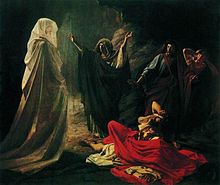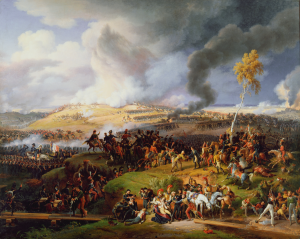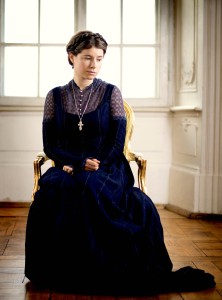Last week we passed 22,500 pages of reading in the Great Books Project. We also have a new work to consider this week, something I know will be a breath of fresh air. Let’s get to it.
Here are the readings for the coming week:
- War and Peace by Leo Tolstoy, Book X, Ch. 1-18 (GBWW Vol. 51, pp. 389-430)
- Leviathan by Thomas Hobbes, Part II, Chapters 27-31 (GBWW Vol. 21, pp. 138-164)
- “On Dreams” by Aristotle (GBWW Vol. 7, pp. 702-706)
- Sonnets LXXI-LXXV by William Shakespeare (GBWW Vol. 25, p. 597)
- Principles of Psychology by William James, Chapter XXVI, beginning to the heading “Ideo-motor Action” (GBWW Vol. 53, pp. 767-790)
- Science and the Modern World by Alfred North Whitehead, Chapters XI-XIII (GBWW Vol. 55, pp. 217-234)
I did not realize it last week, but Q. 102 of the Summa was the end of a major section, so I decided to take a break from St. Thomas for at least a week or two. A short treatise by Aristotle fits the bill. Also, this week we wrap up the Whitehead work.
Here are some observations from the last set of readings:
- War and Peace by Leo Tolstoy, Book IX: War again! Tolstoy gets more overtly philosophical in his discussion of the causes of the war between France and Russia. It’s too big to explain, Napoleon was swept along by events he thought he controlled, etc. Prince Andrew and Rostov wind up with the army again, but their views of the world are very different from what they had been back in the Austerlitz campaign, so the nature of their musings is more interesting to read. Rostov relives the wolf hunt at the front, so I guess that was part of why it received so much space in the earlier book. Meanwhile Pierre is now in love with Natasha, and Petya, just a child at the beginning of the novel, now insists on joining the hussars. Ugh.
- Leviathan by Thomas Hobbes, Part II, Chapters 24-26: After a few pages on how commonwealths are sustained by commodities and other resources, Hobbes talks about the difference between commands and counsel. The sovereign commands others and receives counsel from advisers, but he is not obliged to accept counsel from everyone. Many would-be counselors are incompetent, and others wish him harm. Most of this reading consisted of the chapter on civil laws, which Hobbes classifies in various ways. Defining “fundamental” laws as ones without which the commonwealth dies, Hobbes writes that laws outlining the sovereign’s authority and requiring subjects’ obedience are the fundamental laws. Laws dealing with disputes among subjects aren’t fundamental; they can be changed without any serious threat to the commonwealth. Anyone else liking Hobbes less and less as this goes on?
 The Summa Theologica of St. Thomas Aquinas, Part I, Questions 97-102: The first two questions deal with the body of the pre-fall Adam. St. Thomas argues that he was immortal, but still required food. Adam and Eve still would have reproduced sexually. Then the discussion moves on to their hypothetical children in the state of innocence. They still would have required physical development, and there would have been girls as well as boys. They would have been born “in justice,” but not confirmed, still having the capacity to sin at some point. They would not have had perfect knowledge or reason at birth. The Garden of Eden was a real place intended for the habitation of humans in the state of innocence.
The Summa Theologica of St. Thomas Aquinas, Part I, Questions 97-102: The first two questions deal with the body of the pre-fall Adam. St. Thomas argues that he was immortal, but still required food. Adam and Eve still would have reproduced sexually. Then the discussion moves on to their hypothetical children in the state of innocence. They still would have required physical development, and there would have been girls as well as boys. They would have been born “in justice,” but not confirmed, still having the capacity to sin at some point. They would not have had perfect knowledge or reason at birth. The Garden of Eden was a real place intended for the habitation of humans in the state of innocence.- Sonnets LXVI-LXX by William Shakespeare: There are several notes of discontent in these sonnets, beginning with #66 where the poet says he is tired of life and the world. His friend is likewise too good for this age; nature must preserve him simply as a memorial of an earlier, superior time. Nevertheless, his friend, despite his excellences, has begun to fail in moral character. In #70, though, the poet appears to retract these allegations. Weird.
- Principles of Psychology by William James, Chapter XXV, heading “The Subtler Emotions” to the end: James refers to the moral, intellectual, and aesthetic feelings as the “subtler” emotions. They show the existence of genuinely cerebral forms of pleasure of the sort we experience when we find a mathematical proof “pretty,” etc. But James does not think this undermines his case for the physiological basis of emotion. He thinks they may be “secondary emotions” triggered by external stimuli at one remove. Varying temperaments and capacities for imagination explain the emotional differences among people. James spends the remainder of the chapter speculating on the sources of specific emotions.
- Science and the Modern World by Alfred North Whitehead, Chapters VIII-X: Whitehead moves on to discuss the quantum theory and notes that for the first time science is contemplating the idea of discontinuous existence. He says science pushed philosophy out of the discussion in the modern period as philosophy turned toward the subjective while science inherited the objectivism of the ancient and medieval philosophers. William James et al moved from physiology to psychology just 17th-century physicists moved to philosophy. Both these moves upset the balance between science and philosophy. Rather than explore the Descartes-Locke-Bergson lineage, we need to go back and reexamine the idea of science as the study of the organism beginning with Leibniz. The last chapter dealt with abstractions, and I’m not sure how much of it I understood.
Prayers for all in Texas and Louisiana who are affected by Hurricane Harvey this week. Stay safe and as dry as you can. And I shudder to think of all the books that might be ruined by two feet or more of rain!

 Leviathan by Thomas Hobbes, Part III, Chapters 36-41: Hobbes continues to play word games in this section in an attempt to drain scripture of its supernatural character and its testimony about the supernatural. A good example is his statement that the witch of Endor (1 Samuel 28) was a fraud and that Samuel’s spirit never appeared to Saul. He naturalizes to the greatest extent he can all the passages dealing with prophecy and miracles. He apparently doesn’t know how to handle clearly passages dealing with heaven or hell, but he spills a lot of ink in discussing the nature of the church. We’re not quite there yet, but he appears to be working towards an Erastian framework.
Leviathan by Thomas Hobbes, Part III, Chapters 36-41: Hobbes continues to play word games in this section in an attempt to drain scripture of its supernatural character and its testimony about the supernatural. A good example is his statement that the witch of Endor (1 Samuel 28) was a fraud and that Samuel’s spirit never appeared to Saul. He naturalizes to the greatest extent he can all the passages dealing with prophecy and miracles. He apparently doesn’t know how to handle clearly passages dealing with heaven or hell, but he spills a lot of ink in discussing the nature of the church. We’re not quite there yet, but he appears to be working towards an Erastian framework.
 War and Peace by Leo Tolstoy, Book X.19-39: The Battle of Borodino was a bloody mess. Tolstoy gives many grim details, most dramatically when Prince Andrew is hit by an exploding grenade and in the hospital scene thereafter. The most interesting contrast is between Napoleon and Kutuzov in showing Tolstoy’s philosophy. Napoleon thinks he’s in control and experiences a crisis when things don’t unfold in accordance with his plans, so he tells himself comfortable lies. Kutuzov, on the other hand, recognizes that he is not in control of anything and is only a passive instrument of some greater impersonal force. Thus he issues commands and responds to circumstances much more effectively.
War and Peace by Leo Tolstoy, Book X.19-39: The Battle of Borodino was a bloody mess. Tolstoy gives many grim details, most dramatically when Prince Andrew is hit by an exploding grenade and in the hospital scene thereafter. The most interesting contrast is between Napoleon and Kutuzov in showing Tolstoy’s philosophy. Napoleon thinks he’s in control and experiences a crisis when things don’t unfold in accordance with his plans, so he tells himself comfortable lies. Kutuzov, on the other hand, recognizes that he is not in control of anything and is only a passive instrument of some greater impersonal force. Thus he issues commands and responds to circumstances much more effectively.
 occasion of Mises’s 92nd birthday in 1973. Hazlitt lauds Mises’s contribution to monetary theory and critique of socialism. He also scolds the Nobel committee for not granting Mises its annual prize in economics, which was still relatively new at this point. He speculates that the committee is composed of cowards to don’t wish to appear to be choosing a side in contemporary political debates and would rather award the prize to mathematical economists who write obscurely.
occasion of Mises’s 92nd birthday in 1973. Hazlitt lauds Mises’s contribution to monetary theory and critique of socialism. He also scolds the Nobel committee for not granting Mises its annual prize in economics, which was still relatively new at this point. He speculates that the committee is composed of cowards to don’t wish to appear to be choosing a side in contemporary political debates and would rather award the prize to mathematical economists who write obscurely. War and Peace by Leo Tolstoy, Book X.1-18: Tolstoy really cuts loose here with the French invasion and its impact on his characters. Old Prince Bolkonsky dies after reconciling with Mary, who then faces unruly peasants on the estate as she attempts to evacuate. Rostov comes and bails her out, and she falls in love with him. On the macro-level, Tolstoy goes on about the craziness of the invasion and the attempted response of the Russian elites. Forces larger than anyone are at work, and no one is in control. It’s the same thing we’ve been getting hints of since the beginning, but now the philosophy is very overt.
War and Peace by Leo Tolstoy, Book X.1-18: Tolstoy really cuts loose here with the French invasion and its impact on his characters. Old Prince Bolkonsky dies after reconciling with Mary, who then faces unruly peasants on the estate as she attempts to evacuate. Rostov comes and bails her out, and she falls in love with him. On the macro-level, Tolstoy goes on about the craziness of the invasion and the attempted response of the Russian elites. Forces larger than anyone are at work, and no one is in control. It’s the same thing we’ve been getting hints of since the beginning, but now the philosophy is very overt. The Summa Theologica of St. Thomas Aquinas, Part I, Questions 97-102: The first two questions deal with the body of the pre-fall Adam. St. Thomas argues that he was immortal, but still required food. Adam and Eve still would have reproduced sexually. Then the discussion moves on to their hypothetical children in the state of innocence. They still would have required physical development, and there would have been girls as well as boys. They would have been born “in justice,” but not confirmed, still having the capacity to sin at some point. They would not have had perfect knowledge or reason at birth. The Garden of Eden was a real place intended for the habitation of humans in the state of innocence.
The Summa Theologica of St. Thomas Aquinas, Part I, Questions 97-102: The first two questions deal with the body of the pre-fall Adam. St. Thomas argues that he was immortal, but still required food. Adam and Eve still would have reproduced sexually. Then the discussion moves on to their hypothetical children in the state of innocence. They still would have required physical development, and there would have been girls as well as boys. They would have been born “in justice,” but not confirmed, still having the capacity to sin at some point. They would not have had perfect knowledge or reason at birth. The Garden of Eden was a real place intended for the habitation of humans in the state of innocence.